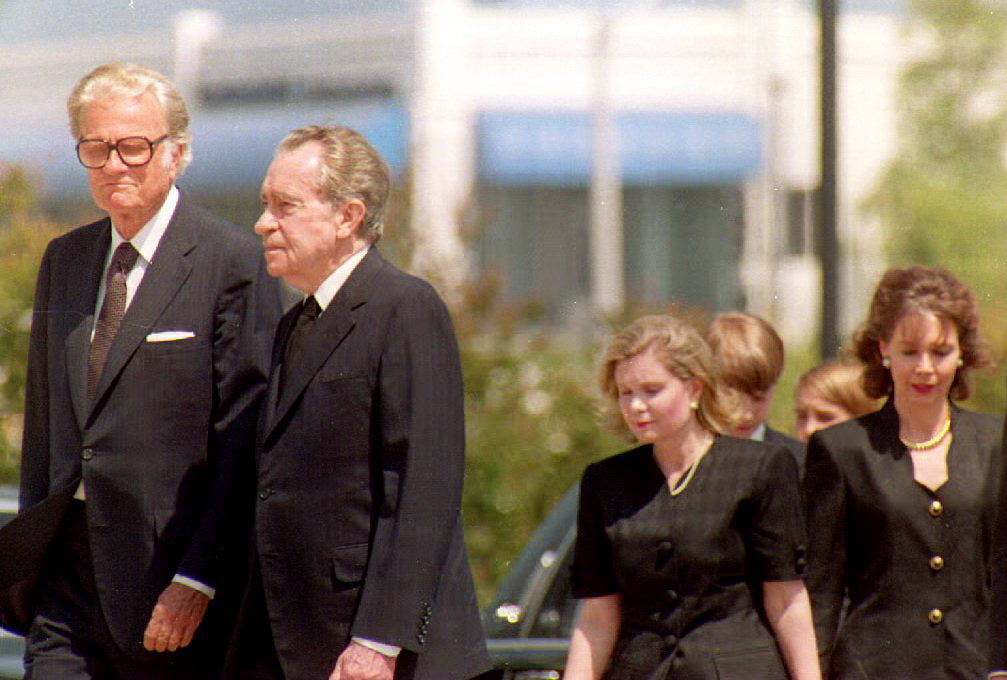Billy Graham once warned evangelicals they 'can't be closely identified with any particular party or person.' What happened?


A free daily email with the biggest news stories of the day – and the best features from TheWeek.com
You are now subscribed
Your newsletter sign-up was successful
The Rev. Billy Graham, who died in his sleep on Wednesday morning at age 99, will lie in repose under a revival-style tent for two days next week before being buried in a coffin made by inmates on March 2, said Mark DeMoss, spokesman for the Billy Graham Evangelistic Association. Graham, known as "America's Pastor," was a counselor to American presidents from Dwight D. Eisenhower to George W. Bush, which was "a source of pride for conservative Christians who were often caricatured as backward," The Associated Press says. But when his good friend Richard Nixon resigned the presidency in disgrace, Graham was "devastated and baffled."
After being burned by Nixon, Graham "resolved to take a lower profile in the political world, going as far as discouraging the Rev. Jerry Falwell, a founder of the Moral Majority, from mixing religion and politics," AP reports, offering this 1981 advice from Graham: "Evangelicals can't be closely identified with any particular party or person. We have to stand in the middle, to preach to all the people, right and left. ... I haven't been faithful to my own advice in the past. I will in the future."
Falwell did not heed Graham's advice — the Moral Majority, and the evangelical Christian power structure Graham made possible, became deeply entwined in Republican politics, but Graham had his lapses, too: He effectively endorsed Republican Mitt Romney in 2012, AP notes. Graham's son and heir, Rev. Franklin Graham, is one of President Trump's most stalwart supporters.
The Week
Escape your echo chamber. Get the facts behind the news, plus analysis from multiple perspectives.

Sign up for The Week's Free Newsletters
From our morning news briefing to a weekly Good News Newsletter, get the best of The Week delivered directly to your inbox.
From our morning news briefing to a weekly Good News Newsletter, get the best of The Week delivered directly to your inbox.
Billy Graham was "firmly committed to remaining bipartisan," but his "legacy of outreach across lines of race, class, and political party doesn't seem as resonant in contemporary evangelicalism," Emma Green says at The Atlantic. "His death marks the end of an era for evangelicalism, and poses a fundamental question: Will his legacy of bipartisan, ecumenical outreach be carried forward?"
A free daily email with the biggest news stories of the day – and the best features from TheWeek.com
Peter has worked as a news and culture writer and editor at The Week since the site's launch in 2008. He covers politics, world affairs, religion and cultural currents. His journalism career began as a copy editor at a financial newswire and has included editorial positions at The New York Times Magazine, Facts on File, and Oregon State University.
-
 James Van Der Beek obituary: fresh-faced Dawson’s Creek star
James Van Der Beek obituary: fresh-faced Dawson’s Creek starIn The Spotlight Van Der Beek fronted one of the most successful teen dramas of the 90s – but his Dawson fame proved a double-edged sword
-
 Is Andrew’s arrest the end for the monarchy?
Is Andrew’s arrest the end for the monarchy?Today's Big Question The King has distanced the Royal Family from his disgraced brother but a ‘fit of revolutionary disgust’ could still wipe them out
-
 Quiz of The Week: 14 – 20 February
Quiz of The Week: 14 – 20 FebruaryQuiz Have you been paying attention to The Week’s news?
-
 ‘One Battle After Another’ wins Critics Choice honors
‘One Battle After Another’ wins Critics Choice honorsSpeed Read Paul Thomas Anderson’s latest film, which stars Leonardo DiCaprio, won best picture at the 31st Critics Choice Awards
-
 Son arrested over killing of Rob and Michele Reiner
Son arrested over killing of Rob and Michele ReinerSpeed Read Nick, the 32-year-old son of Hollywood director Rob Reiner, has been booked for the murder of his parents
-
 Rob Reiner, wife dead in ‘apparent homicide’
Rob Reiner, wife dead in ‘apparent homicide’speed read The Reiners, found in their Los Angeles home, ‘had injuries consistent with being stabbed’
-
 Hungary’s Krasznahorkai wins Nobel for literature
Hungary’s Krasznahorkai wins Nobel for literatureSpeed Read László Krasznahorkai is the author of acclaimed novels like ‘The Melancholy of Resistance’ and ‘Satantango’
-
 Primatologist Jane Goodall dies at 91
Primatologist Jane Goodall dies at 91Speed Read She rose to fame following her groundbreaking field research with chimpanzees
-
 Florida erases rainbow crosswalk at Pulse nightclub
Florida erases rainbow crosswalk at Pulse nightclubSpeed Read The colorful crosswalk was outside the former LGBTQ nightclub where 49 people were killed in a 2016 shooting
-
 Trump says Smithsonian too focused on slavery's ills
Trump says Smithsonian too focused on slavery's illsSpeed Read The president would prefer the museum to highlight 'success,' 'brightness' and 'the future'
-
 Trump to host Kennedy Honors for Kiss, Stallone
Trump to host Kennedy Honors for Kiss, StalloneSpeed Read Actor Sylvester Stallone and the glam-rock band Kiss were among those named as this year's inductees
